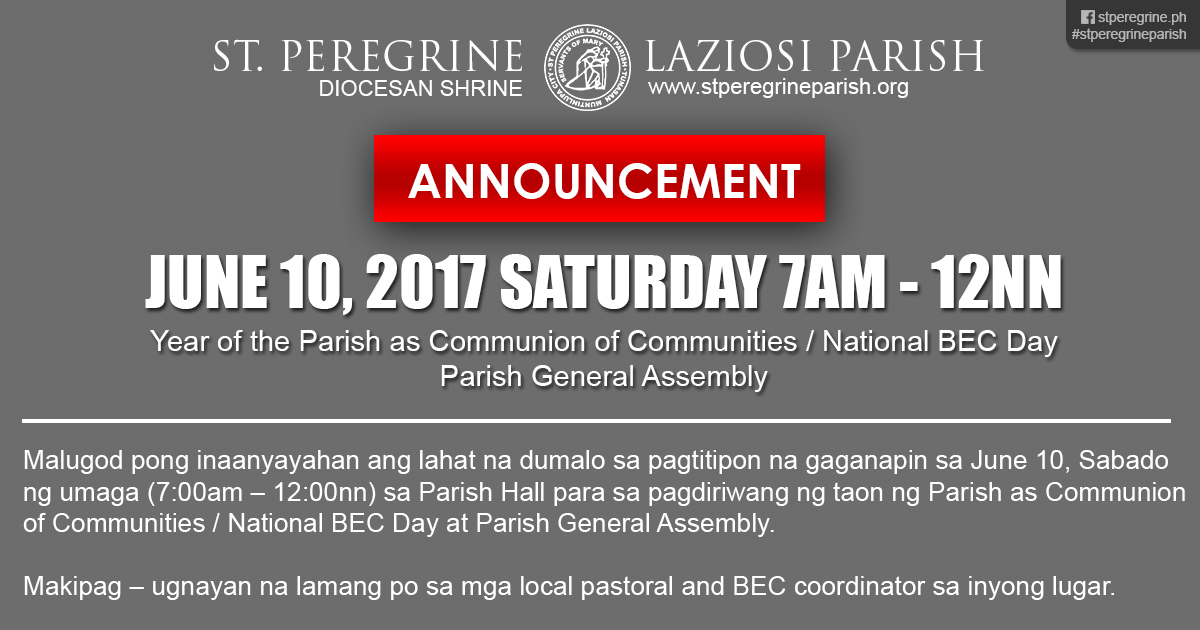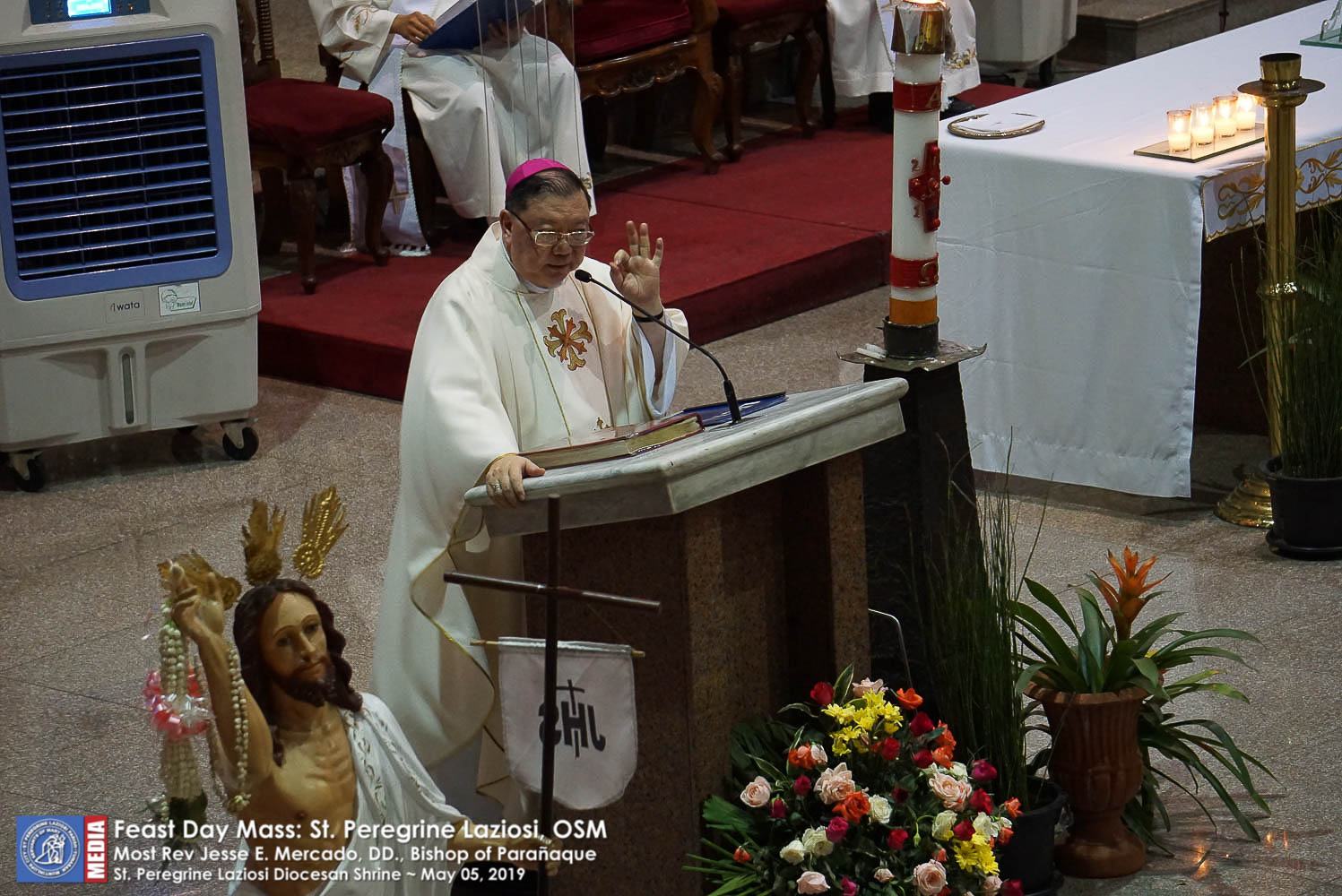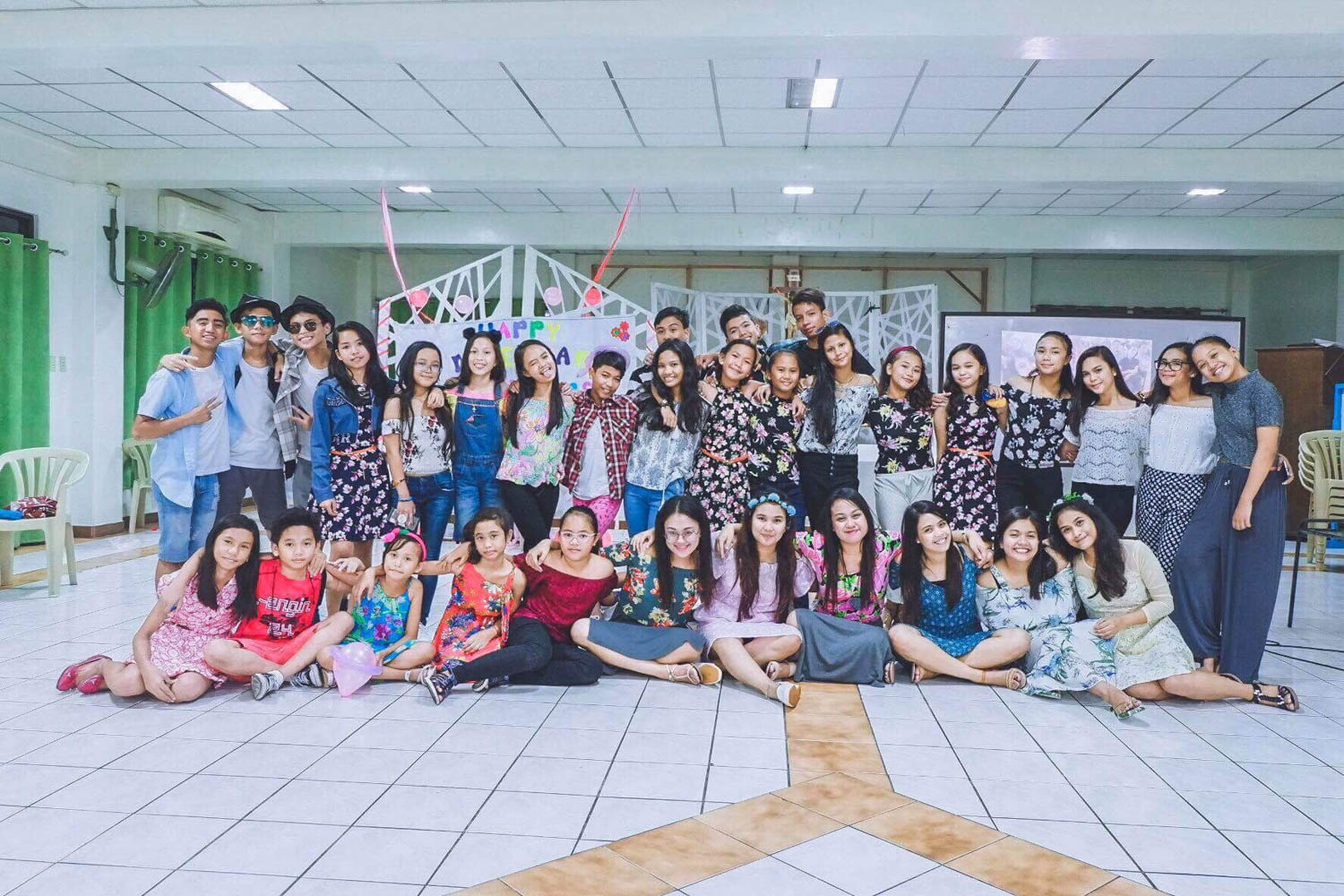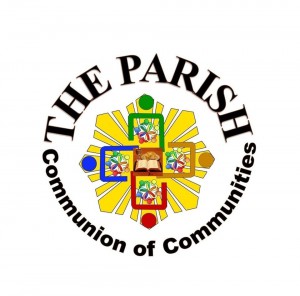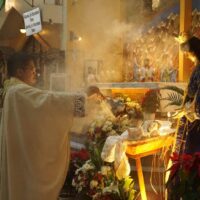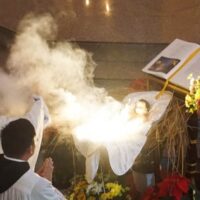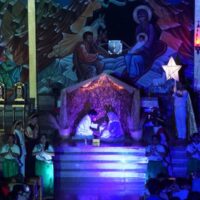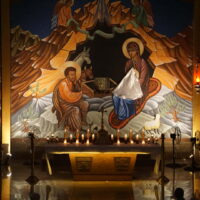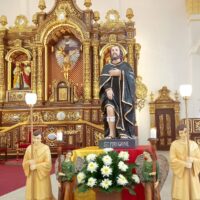PASTORAL LETTER
“For just as each of us has one body with many members, and these members do not all have the same function, so in Christ we, though many, form one body, and each member belongs to all the others. We have different gifts, according to the grace given to each of us.” (Rom 12:4-6)
In 2017, our diocese will pass the midpoint of our “Decade of New Evangelization” in preparation for the 500th anniversary of the first Eucharist and Baptism in the Philippines. Coming from the celebration of the Year of the Eucharist and the Family this 2016, we now turn our gaze towards a celebration of the Year of the Parish as “Communion of Communities,” with 2017 serving as a year of discernment and deeper reflection on the quality of our living out the Christian faith in and through the parish. Within this yearlong celebration, our hope is to also usher in a renewed emphasis on Basic Ecclesial Communities (BEC) as a way of being Church and serving as agents of communion, participation and mission.
To guide our diocese in such introspection, let us look atour very own Vision and Mission Statements:
VISION
We, the local church of the Diocese of Parañaque, envision ourselves as a communion of diverse communities, embracing and sharing in Jesus’ mission to proclaim the Reign of the Father, constantly renewed by the Holy Spirit and accompanied by Mary, our mother and model.
MISSION
As a Diocese, we commit ourselves to proclaim the Kingdom of God by:
- Recognizing the primacy of grace and our need for continual renewal (aggiornamento);
- Building Basic Ecclesial Communities as the way of being church and experiencing communion (communio);
- Engaging in the integral evangelization of all, particularly the developing communities, the family and the youth (missio).
Ten years after the Diocesan Pastoral Assembly, we can find comfort in knowing that much has been done to make our Vision a reality. But with all humility, we also acknowledge that much work remains to be done. “Recognizing the primacy of grace and our need for continual renewal[1],” we look at the parish as a community that needs constant renewal while also serving as a venue for the constant renewal of the universal Church:
“It is [in the parish] that the full ministry and life of the Church is experienced by the faithful in a regular basis. In the diocese the parish continues to be the customary place where the faithful grow in holiness, to participate in the mission of the Church and to live out ecclesial communion.”[2]
In the same way that the universality of the Church is experienced in the local Churches, so do we look to the parish for the particular expression of the local Church of Parañaque as a communion of diverse communities. In this regard, the role of the pastor and parish priest is of great importance – not as an authority who dictates parish life, but as a shepherd with the charism of identifying the many gifts of parishioners and enabling them to better serve the parish. This role of the pastor becomes especially relevant today, for while our diocese celebrates the Year of the Parish, we will also see to the second general reshuffling of parish priests’ assignments. With this new chapter in the ministerial life of our diocesan priests, the hope is that it nourishes their sense of mission while allowing their fresh presence to reinvigorate the life of the parish they will be assigned to.
However,the parish as a communion of communities will only be fully realized if the laity recognizes their important role as co-shepherds andimmerse themselves in an experience of shared leadership. This requires the laity to be more than passive recipients of parish services or even being mere “helpers” and “servants,” and become collaborators with their pastors.
“If your gift is prophesying, then prophesy in accordance with your faith; if it is serving, then serve; if it is teaching, then teach; if it is to encourage, then give encouragement; if it is giving, then give generously; if it is to lead, do it diligently; if it is to show mercy, do it cheerfully.”[3]
Only when the laity in every parish actively engage Jesus’ invitation to be his co-workers in proclaiming the reign of the Father, serving the community through their varied charisms, will the vision of our diocese being a communion of diverse communities begin to take shape and give hope to its fulfillment.
Our work of cultivating the parish into a communion of communitiesis being achieved primarily, though not exclusively, through the Basic Ecclesial Communities. BECs are envisioned to be “small communities of Christians, usually of families who gather together around the Word of God and the Eucharist. These communities are united to their pastors but are ministered to regularly by lay leaders”[4] In BECs, the Word of God and the Eucharist is shared more accessibly and intimately in a smaller setting, allowing the sharing not only of spiritual but also material concerns. The more intimate grouping allows its members to better know each other, have a stronger sense of belongingness, pray together, and serve one another. In this sense, the BECs could be seen as the diverse communities to be brought together to foster communion in the parish. It is through the BECs that the Parish makes it presence felt, widens its reach beyond the actual Parish church structure, to raise awareness among the faithful of their belongingness to a parish, and invite the faithful to participate in the life and mission of the parish.
I invite everyone, therefore, to a renewed commitment to the Vision and Mission we arrived at in our Diocesan Pastoral Assembly in 2006. The dream of our diocese becoming a communion of diverse communities united with Christ in his mission of evangelization is to be realized concretely in the Parish, in and through the fostering of BECs. This is, as we have already experienced, a long, arduous, but nonetheless joyous and fulfilling process. Also, in this Year of the Parish, let us take time to assess whether new commissions need to be established or whether existing commissions should be prioritized to better empower the Catholic faithful to respond to the mission of evangelization. “[L]et us consider how we may spur one another on toward love and good deeds, not giving up meeting together, as some are in the habit of doing, but encouraging one another”.[5]
Let us turn again to our Blessed Mother and ask her to intercede for us, that we may find the grace to work together in making Jesus’ dream a reality: “that all of them may be one, Father, just as you are in me and I am in you.”[6]
And as one with the all the local Churches in the Philippines, I invite everyone to pray this prayer for this Year of the Parish:
Loving God, you gather us as a people of the new covenant sealed with the blood of your beloved Son, our Lord Jesus Christ. You formed us into a community of faith, hope and love; a priestly, prophetic and kingly people.
Humbly we ask you, make our parishes truly a communion of communities; a worshipping community, a witnessing and an evangelizing community, and a servant community.
Guide our pastors, the religious and lay leaders, and all those who labor in the parish, with your wisdom and love.
Bless all the parishioners who compose the parish and BEC’s, as they offer their time, talents and treasures as stewards of the graces you gifted us, for the building up of your Church.
May the Holy Spirit enlighten, inspire and invigorate us to actively participate in the mission you entrusted to us in the parish. May we continue to be a discerning community, reading the signs of the times and interpreting them in the light of the Gospel.
May we truly become the leaven in society by penetrating all its strata with the Gospel and restoring its order according to the values of the Kingdom.
And may the spirit of collaboration and co-responsibility bring us into a fuller and fruitful communion with you and with one another.
We ask this through Christ, our Lord. Amen.
Jesse E. Mercado, D.D.
Bishop of Parañaque
[1] Mission Statement of the Diocese of Parañaque
[2] PCP II 598
[3] Romans 12:7-9
[4] PCP II 138
[5] Hebrews 10:24-25
[6] John 17:21
 Diocese of Parañaque
Diocese of Parañaque

